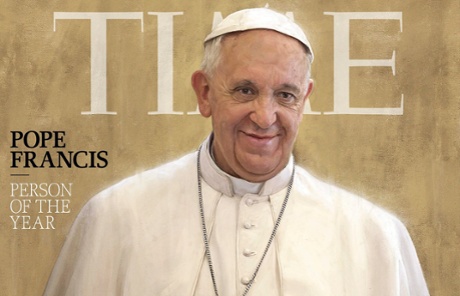Pope Francis, Time person of the year, should be rebranded as the PR Pope
SEE MATTHEW 6: 1-7, 16-18 ON PUBLIC, NARCISSISTIC, SHOW-OFF, SALACIOUS, VAIN, THEATRICAL, SELF-ABSORBED, MANIPULATIVE DISPLAYS OF PIETY, CHARITY, HUMILITY, PRAYER AND HOLINESS

Would you like to be a Roman Catholic? I’m not kidding around – do you want to be that person? Do you want the wine and wafers? The bells and smells? The celibate priests, the encyclicals, the rosaries and the genuflecting? The Kyrie Eleisons, Glorias and Agnus Deis? The no abortions, never, ever? Because if you don’t, I can’t understand why you’re thrilled with Pope Francis.
Nor can I understand why Time Magazine’s managing editor, Nancy Gibbs, who comes from a devout family of Presbyterians, would write up a glowing profile of Francis, Time’s person of the year. I’d have thought such a thing would be anathema to a Protestant, and especially one of Gibbs’ pedigree: her mother was a church elder, something that would be considered beyond the pale by Time’s “people’s Pope”. His popularity is so vast that even those who would be excluded by the organisation he governs applaud him. If that’s not a public relations coup, I don’t know what is. Perhaps he should be rebranded accordingly: not the people’s Pope, but the PR Pope.
Francis has been able to rebrand the church so quickly because few people really get that the operating mechanism at the heart of the Catholic mode of Christianity isn’t faith, but grace – which the catechism of the church describes as a “gratuitous gift that God makes to us of his own life, infused by the Holy Spirit into our soul to heal it of sin and to sanctify it.”
By gratuitous, theologians like St Augustine mean that God receives no benefit himself from having made creation. If he did, then grace would be the payment of a debt, or a kind of transaction – not a gift. In all, the consequence of accepting God’s grace is that, first, you recognise the enormity of his love, but, as the radical theologian Herbert McCabe wrote, “the sign that we recognise this love for God for us, the sign of our faith, is that we love each other”.
Perhaps it’s churlish, but when it comes to Francis perhaps we shouldn’t shower him with garlands for doing the one thing that a Christian should do anyway. Surprise, surprise! The Pope’s a Catholic, and the holiest one on Earth at that.
What matters is that the church believes it alone dispenses the visible signs of grace on earth – the sacraments – in their only authentic form. This is not democratic; the church grants itself the privilege of ordering the world accordingly. Just this month Francis reiterated that the sensus fidelium, the “sense of the faithful” on matters of religion, is unconcerned with the majority opinion: it is the role of the clergy and theologians to “discern”.
Obviously, the sketch I’ve drawn just now is nothing more than thumbnail theology. In my defence, most of those praising Francis’ apostolic exhortation, Evangelii Gaudium, have ignored its theological nature altogether – another successful PR sleight of hand by the Pope in an age where people are cynical of moralising from the pulpit. It’s not an economic or political document, which is why it begins “The joy of the gospel fills the hearts and lives of all who encounter Jesus,” and not “A spectre is haunting Europe” or “Who is John Galt?”.
It should be read as part of the century-old tradition of Catholic social teaching, which began in 1891 with the Encyclical Rerum Novarum. This project has never really been anti-capitalist, or even anti-communist. As Pope Leo XIII wrote, the enemies of the church’s moral order are “crafty agitators”, those who are “disturbing the nations of the world” – by which he meant Christendom.
To that end, Leo said that society was not built on class antagonism, but on “the relative rights and mutual duties of the rich and of the poor, of capital and of labor.” By capital, he was speaking broadly of the late 19th century employer class, who accumulated the surplus wealth from their workers’ labour for further investment. Nonetheless, Leo wrote, “to gather one’s profit out of the need of another, is condemned by all laws, human and divine … The great mistake [is] the notion that class is naturally hostile to class, and that the wealthy and the working men are intended by nature to live in mutual conflict”.
In McCabe’s characterisation, Rerum Novarum was a “prescription for an ideal consensus society.” Of course, in the corporatist tradition of the church, capital makes the ideal society, and labour does the consenting. It laid out duties for workers and politely asked the rich to try and avoid being nasty, most famously in the euphemistic “preferential option for the poor”. What was missing then, and continues to be absent in Catholic teaching now, is a clear picture of who is doing the oppressing – in the church’s view, everyone just needs to pull together.
Such a witness seems radical now because the old thing that did the disturbing, communism, no longer exists. It was crushed brutally by the Catholic church, led in its crucial hour by the ultraorthodox Pope John Paul II, himself a figure of popular appeal like Francis. Obviously, the Catholics didn’t do it alone. The church found allies in Ronald Reagan and Margaret Thatcher, and enabled Augusto Pinochet and, in Australia,BA Santamaria – the progenitors and beneficiaries of the capitalist order Francis is now lauded by many for campaigning against.
Francis’ onslaught on capitalism is at heart a critique of the way consumerism and the “false idol” of money erode the church’s proper authority to order the world. This is not about liberation; it instead highlights how materialism prevents people from “assenting” to the gift of grace, which the church alone interprets and distributes. While Evangelii Gaudium is addressed to all of us, its intended audience is still, as always, capital.
Francis speaks of “a crude and naive trust in the goodness of those wielding economic power and in the sacralised workings of the prevailing economic system”. He would be hard-pressed to find much naive trust among a working populace increasingly cynical with the current order – one could point to the Arab Spring, Occupy, the Indignados, protests in Greece, the student riots in the UK, the protests over the Trans-Pacific Partnership, the riots currently taking place in Kiev and others as evidence.
What he is really doing is extending an invitation for capital to return to the church. He is not calling for fundamental changes to the political and economic order, and his papacy shouldn’t be seen as such. The fact that so many ordinary people and non-Catholics recently felt a pang of shame followed by admiration for the Pope’s holiness shows the tried and true Catholic guilt still works to keep us quiet, even in our supposedly rational 21st century.
Now that’s what I call a PR victory – maybe Francis really is person of the year after all.

